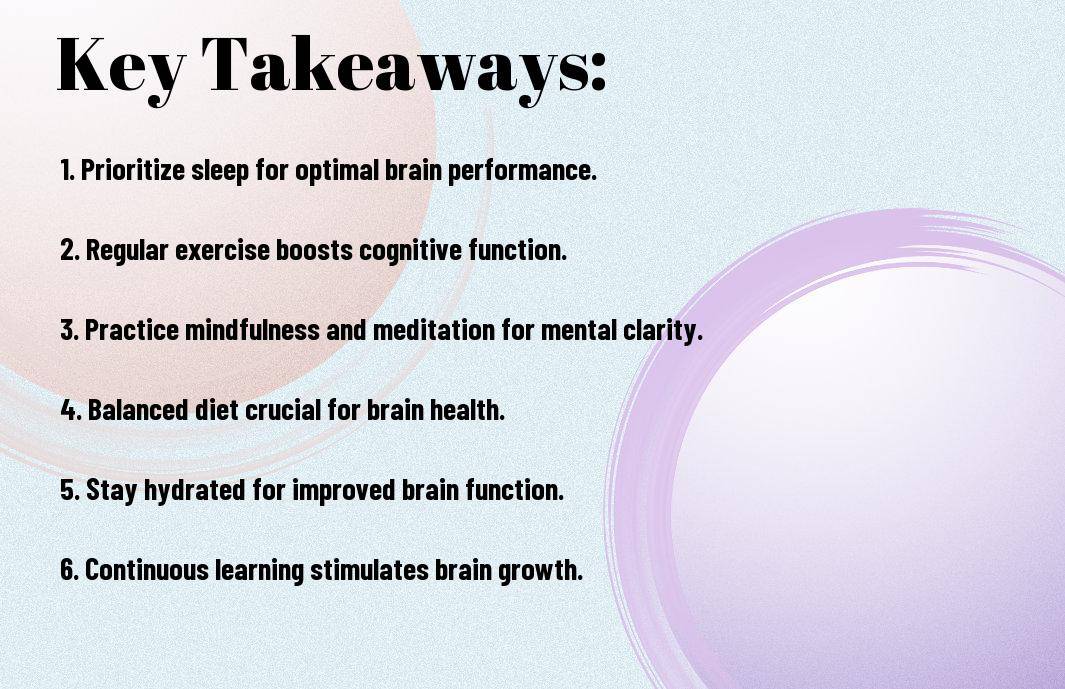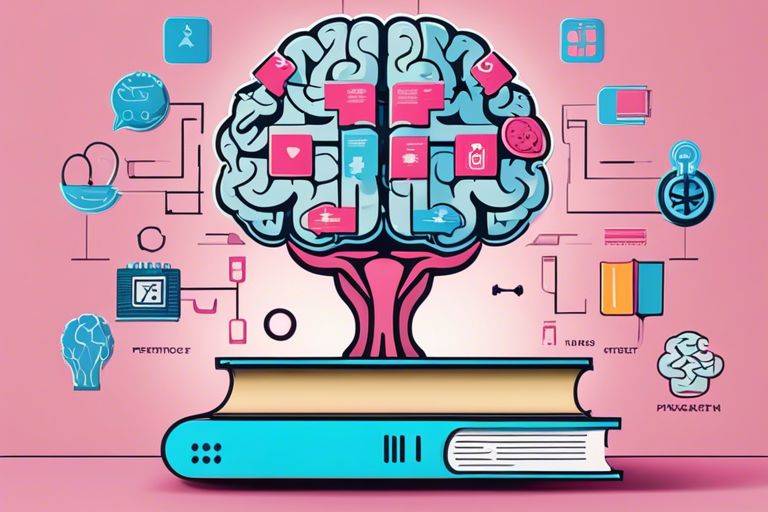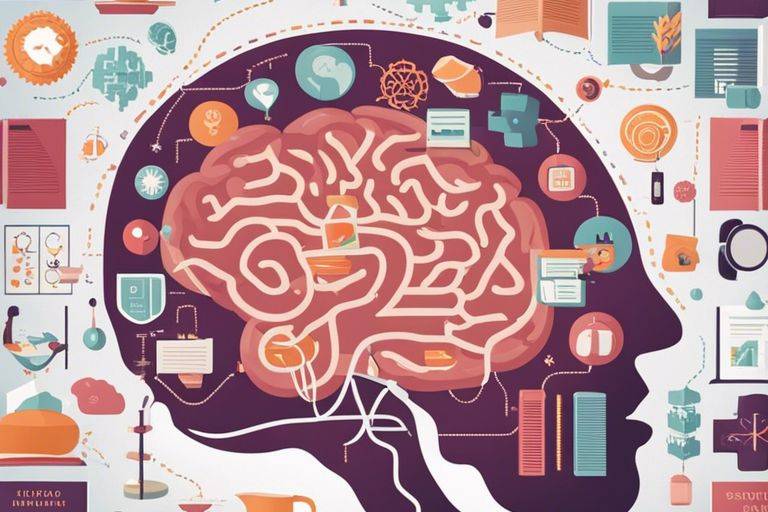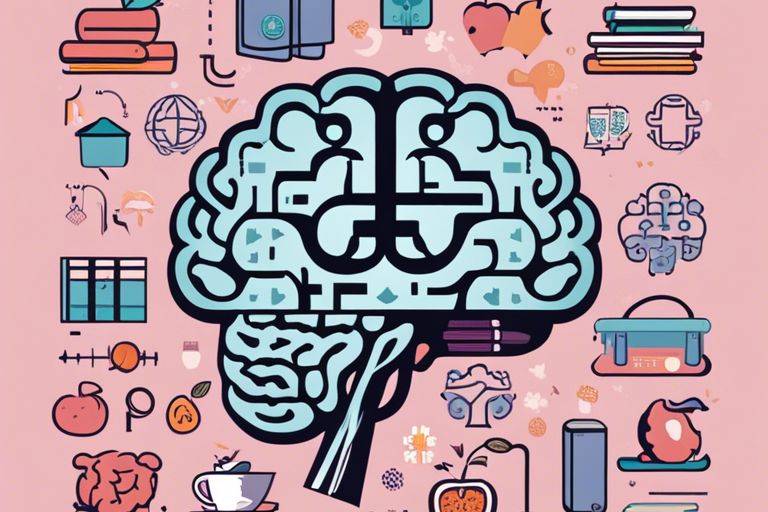Life Hacking! Brain Function! With the constant demands of modern life, it’s vital to ensure that our brains are functioning at their best. Enhanced brain function not only helps us stay sharp and focused but also improves our overall quality of life. In this blog post, we will uncover some secrets to boost your brainpower and optimize your cognitive abilities for improved productivity and mental well-being.
Key Takeaways:
- Optimize your nutrition: Consuming brain-friendly foods like blueberries, nuts, and fatty fish can enhance cognitive function.
- Get quality sleep: Aim for 7-9 hours of quality sleep each night to allow your brain to recharge and improve memory retention.
- Exercise regularly: Physical activity boosts blood flow to the brain, promoting the growth of new neurons and improving cognitive function.
- Practice mindfulness: Mindfulness techniques like meditation can reduce stress, improve focus, and enhance mental clarity.
- Stay hydrated: Dehydration can impair cognitive function, so drink plenty of water throughout the day to keep your brain sharp.
- Challenge your brain: Engage in activities that stimulate your brain, such as puzzles, reading, or learning a new skill, to enhance cognitive function and prevent mental decline.
- Manage stress: Chronic stress can impair brain function, so practice stress-reducing activities like yoga, deep breathing, or spending time in nature to optimize your brain health.

Understanding Brain Health
Some of the most important aspects of enhancing brain function revolve around understanding the intricacies of brain health. By delving deeper into how the brain operates and what factors can influence its health, we can unlock the secrets to optimizing our cognitive abilities.
Basics of Brain Function
Brain function is a complex interplay of neurons, neurotransmitters, and neural pathways that allow us to think, feel, and act. The brain is responsible for controlling every function in our body, from breathing to problem-solving. Understanding how the brain processes information, forms memories, and regulates emotions is crucial in maximizing its potential.
Factors Influencing Brain Health
An individual’s brain health is influenced by a myriad of factors, including nutrition, sleep, exercise, mental stimulation, and stress management. These elements play a crucial role in shaping the brain’s structure and function, ultimately impacting cognitive performance and overall well-being. Perceiving the importance of each factor is necessary in maintaining optimal brain health.
- Nutrition: A diet rich in antioxidants, omega-3 fatty acids, and necessary nutrients can positively impact brain health.
- Sleep: Adequate rest is necessary for brain function, memory consolidation, and overall cognitive performance. Perceiving the importance of quality sleep is crucial in optimizing brain health.
- Exercise: Physical activity promotes blood flow to the brain, enhances neuroplasticity, and boosts mood and cognitive function. Implementing regular exercise routines can significantly benefit brain health.
- Mental Stimulation: Engaging in activities that challenge the brain, such as puzzles, learning new skills, or social interactions, can improve cognitive function and prevent cognitive decline. Prioritizing mental stimulation is key to enhancing brain health.
- Stress Management: Chronic stress can negatively impact brain health, leading to cognitive impairments and increased risk of neurological disorders. Developing stress management techniques, such as mindfulness and relaxation exercises, is crucial for maintaining a healthy brain.
Nutrition and the Brain
Despite the brain being only about 2% of our body weight, it requires a disproportionate amount of nutrients to function optimally. Proper nutrition is important for overall brain health, as it can affect our cognitive function, mood, and even our risk for developing neurological disorders.
Essential Brain Nutrients
Any deficiency in important brain nutrients can have a significant impact on our cognitive abilities. Key nutrients for brain health include omega-3 fatty acids, vitamins B6, B12, and E, as well as minerals like magnesium, iron, and zinc. These nutrients play vital roles in neurotransmitter synthesis, antioxidant defense, and overall brain function.
Dietary Patterns for Optimal Brain Function
Essential to optimal brain function is a balanced diet that includes a variety of whole foods rich in important nutrients. Diets high in antioxidants, such as fruits and vegetables, can help protect the brain from oxidative stress and inflammation. Consuming omega-3 fatty acids from sources like fatty fish, flaxseeds, and walnuts can support healthy brain structure and function.
Physical Exercise and Cognitive Enhancement
The Impact of Exercise on the Brain
After years of research, the connection between physical exercise and cognitive function has become clear. An active lifestyle not only benefits the body but also has a profound impact on the brain. When you engage in regular physical activity, you are not just improving your physical fitness, but you are also enhancing your mental well-being. Studies have shown that exercise can help boost memory, increase focus, and even prevent cognitive decline as we age.
Exercise Regimens to Boost Brain Health
To improve brain function, it is vital to incorporate specific exercise regimens into your routine. To boost brain health, consider incorporating a combination of cardiovascular exercises like running or cycling, strength training, and mind-body exercises such as yoga or tai chi. These diverse activities can help improve blood flow to the brain, stimulate the growth of new neurons, and enhance overall cognitive function.
With a well-rounded exercise routine, you can experience a significant improvement in your cognitive abilities, including better focus, increased creativity, and improved problem-solving skills. Bear in mind, consistency is key when it comes to reaping the full benefits of physical exercise on your brain.

Cognitive Training and Mental Fitness
For The Ultimate Guide to Hacking Your Brain for Enhanced Productivity, cognitive training plays a crucial role in enhancing brain function and mental fitness. Brain-training games have gained popularity for their potential to improve cognitive abilities such as memory, attention, and problem-solving skills.
Brain-Training Games and Their Effectiveness
Brain-training games have been designed to challenge and stimulate different areas of the brain, with the goal of enhancing overall cognitive function. While some studies suggest that these games can lead to improvements in specific cognitive abilities, their overall effectiveness in improving general intelligence remains controversial. It is important to approach these games as a complementary tool to other cognitive training methods, rather than a sole solution for enhancing brain function.
Mindfulness and Meditation Practices for Cognitive Improvement
Their mindfulness and meditation practices have been shown to have a profound impact on cognitive function and mental well-being. By incorporating mindfulness techniques into daily routines, individuals can improve their focus, attention, and emotional regulation. These practices not only enhance cognitive abilities but also promote stress reduction and overall mental clarity.
Optimizing Sleep for Brain Function
To achieve enhanced brain function, it is vital to prioritize optimizing your sleep. It is during sleep that many crucial brain functions occur, including memory consolidation, emotional processing, and overall cognitive performance.
The Relationship Between Sleep and Memory
An adequate amount of quality sleep plays a vital role in memory consolidation. During the various stages of sleep, the brain processes and stores information gathered throughout the day. Lack of sleep can lead to difficulties in forming new memories and retaining information effectively. It is during deep sleep stages that the brain solidifies memories, making them easier to access in the future.
Strategies to Improve Sleep Quality
Quality sleep is not just about the number of hours you spend in bed but also the depth and restorative nature of your sleep. Setting a consistent sleep schedule, creating a relaxing bedtime routine, and optimizing your sleep environment by keeping it dark, quiet, and cool can all contribute to better sleep quality. Additionally, avoiding caffeine, electronic devices, and vigorous exercise close to bedtime can help signal to your body that it is time to wind down and prepare for rest.
Plus, incorporating relaxation techniques such as deep breathing exercises or meditation before bed can further promote relaxation and help you fall asleep more easily. Keep in mind, quality sleep is a cornerstone of overall brain health and function, so investing time and effort into improving your sleep habits will pay off in numerous cognitive benefits.
Stress Management for Mental Clarity
All too often, stress can wreak havoc on our brains, affecting our cognitive function and clarity of thought.
The Effect of Stress on Brain Function
Chronic stress can lead to a surplus of cortisol in the body, which in turn can impair the function of the prefrontal cortex – the area of the brain responsible for decision-making, problem-solving, and emotional regulation. This imbalance can result in difficulties concentrating, memory lapses, and a general feeling of mental fog.
Techniques for Managing and Reducing Stress
On the bright side, there are several effective techniques for managing and reducing stress to promote mental clarity. Regular physical exercise, deep breathing exercises, mindfulness meditation, and adequate sleep are all powerful tools for combating stress and improving brain function. These practices not only help reduce cortisol levels but also increase the production of endorphins and serotonin, which are neurotransmitters associated with feelings of happiness and well-being.
Plus, incorporating stress-relief activities like yoga or tai chi into your routine can have a profound impact on your overall mental health. These practices not only help relax the body but also calm the mind, leading to enhanced focus and clarity. It’s crucial to prioritize stress management in your daily life to optimize your brain function and maintain mental sharpness.
Nootropics and Cognitive Enhancers
Understanding Nootropics and Their Uses
To enhance brain function, some individuals turn to nootropics and cognitive enhancers. These substances are designed to improve cognitive functions such as memory, creativity, and motivation. Nootropics work by altering the levels of neurotransmitters, enzymes, and other chemicals in the brain to enhance mental performance.
Risks and Benefits of Cognitive Enhancing Supplements
Their popularity has grown due to the promise of improved focus and productivity. However, it’s crucial to understand the risks and benefits associated with these supplements before incorporating them into your routine. While some people may experience enhanced cognitive function, others may encounter side effects such as insomnia, headaches, or increased heart rate.
Plus, it’s important to note that long-term effects of cognitive enhancing supplements are still unclear. Some studies suggest that certain nootropics may carry a risk of dependency or tolerance, leading to potential abuse.

Technology and Brain Enhancement
Once again, technology offers numerous possibilities for enhancing brain function. Research studies such as Hacking the Brain: Dimensions of Cognitive Enhancement probe into the potential benefits and risks associated with cognitive enhancement techniques.
Innovative Tools for Cognitive Development
One of the exciting developments in the field of cognitive enhancement is the emergence of innovative tools that aid in cognitive development. From brain-training apps to neurofeedback devices, individuals now have access to a variety of resources to improve their cognitive abilities. These tools can help enhance memory, concentration, and problem-solving skills, ultimately leading to better overall brain function.
The Ethics of Brain Enhancement Technology
Enhancement
Brain enhancement technologies raise important ethical considerations that must be carefully examined. While the potential to improve brain function is enticing, it also opens a Pandora’s box of ethical dilemmas. Questions surrounding fairness, accessibility, and the impact of cognitive enhancement on society as a whole must be addressed. It is crucial for researchers and policymakers to navigate these ethical complexities to ensure that brain enhancement technologies are deployed responsibly and ethically.
Summing up
Taking this into account, mastering life hacks that enhance brain function is crucial for improving productivity, focus, and overall well-being. By implementing the tips and strategies found in resources like BRAIN HACKS: Life-Changing Strategies to Improve Your Cognitive Function, individuals can unlock their full cognitive potential and achieve greater success in all areas of life.
FAQ
Q: What is life hacking?
A: Life hacking is the practice of finding innovative and efficient ways to simplify tasks and increase productivity in everyday life.
Q: How can life hacking enhance brain function?
A: Life hacking techniques can help optimize brain function by improving focus, memory, creativity, and overall cognitive performance.
Q: What are some simple life hacks to boost brain function?
A: Simple life hacks to boost brain function include getting enough sleep, regular exercise, eating a healthy diet, staying hydrated, and practicing mindfulness.
Q: Can technology be used for life hacking and enhancing brain function?
A: Yes, technology tools such as productivity apps, brain training games, and meditation apps can be used for life hacking and enhancing brain function.
Q: How important is a healthy lifestyle in enhancing brain function?
A: A healthy lifestyle plays a crucial role in enhancing brain function. Regular exercise, a balanced diet, quality sleep, and stress management are important for optimal brain health.
Q: What role does mindset play in life hacking and brain function?
A: A positive mindset and a growth-oriented attitude are key factors in successful life hacking and enhancing brain function. Believing in your ability to improve and adapt is important for progress.
Q: How can organization and time management skills contribute to enhanced brain function?
A: Being organized and managing your time effectively can reduce stress, increase productivity, and free up mental space for more important tasks, ultimately enhancing brain function.
Dive Deeper
Time Blocking – The Ultimate Guide to Allocating Specific Time Slots for Tasks
Zero-Based Calendar – Strategically Schedule Every Minute for Unparalleled Productivity
The One Thing – Gary Keller and Jay Papasan’s Focus on Making Everything Else Easier
Breakdown Method – Tackling Overwhelming Tasks by Breaking Them Down
The 1-3-5 Rule – A Strategy to Balance Task Completion Across Complexity



